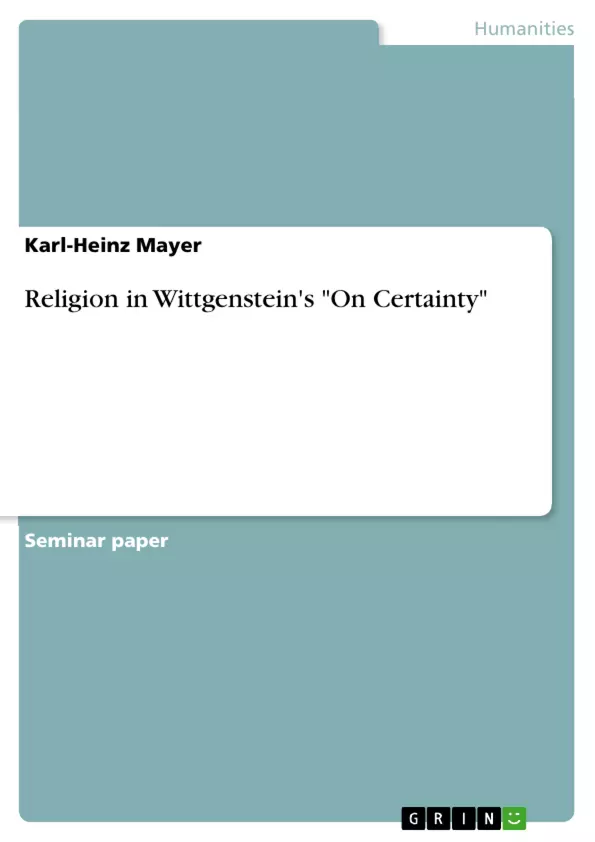The phenomenon of religious belief poses many interesting and challenging questions: Those who don’t have the privilege of believing in miracles, divine providence, or resurrection often find it difficult to understand the meaning of religious concepts in a society characterized by a primarily scientific paradigm in fields like economy, technics, justice, or politics.
A number of questions concerning religious belief seem to have puzzled also Ludwig Wittgenstein and he came up with interesting questions and answers to this effect.
His concept of hinge beliefs, if applicable to religious belief, is a surprising and convincing explanation of the phenomenon of religious belief.
But can it really be applied to religion and did Wittgenstein do that?
This paper will try to find answers to these questions.
Table of Contents
- Introduction
- Wittgenstein's Relation to Religious Belief
- Considerations Pertinent to Religion in On Certainty
- Knowing and Believing
- Doubt and Certainty
- Questions about Religion and Possible Wittgensteinian Answers
- Epistemological Considerations
Objectives and Key Themes
This paper aims to explore the connection between religious belief and Ludwig Wittgenstein's later philosophy, particularly his work "On Certainty." It examines how Wittgenstein's concept of hinge beliefs can be applied to religious beliefs, and investigates the potential for understanding diverse world-pictures through his epistemological framework.
- The nature of religious belief and its relationship to knowledge and certainty
- Wittgenstein's concept of hinge beliefs and their potential applicability to religious beliefs
- The coexistence of religious and secular world-pictures
- The acquisition and nature of religious belief
- The relationship between religious belief and the conduct of one's life
Chapter Summaries
- Introduction: This chapter introduces the paper's objective, which is to analyze the relationship between religious belief and Wittgenstein's work "On Certainty." It poses several questions relevant to religion and anticipates finding potential answers within Wittgenstein's philosophy.
- Wittgenstein's Relation to Religious Belief: This chapter examines Wittgenstein's personal journey with religion, from his upbringing to his later philosophical reflections. It explores how his attitude towards religion evolved, and how his writings reflect his inner conflicts regarding faith and belief.
- Considerations Pertinent to Religion in On Certainty: This chapter delves into key concepts from "On Certainty" that are relevant to understanding religious belief. It examines the distinction between "knowing" and "believing," the relationship between doubt and certainty, and the role of world-pictures, language games, and mysticism in shaping belief systems.
Keywords
The paper focuses on key concepts like religious belief, knowledge, certainty, doubt, hinge beliefs, world-pictures, language games, and the influence of Ludwig Wittgenstein's philosophical work "On Certainty" on understanding these topics.
Frequently Asked Questions
What is the central focus of the paper on Wittgenstein and religion?
The paper explores how Ludwig Wittgenstein's later philosophy, specifically his concept of "hinge beliefs" from "On Certainty," can be used to understand religious belief.
What are "hinge beliefs" in Wittgenstein's philosophy?
Hinge beliefs are fundamental, non-rational certainties that underlie our language games and world-pictures; they "stay fast" so that other questions can be asked.
How does Wittgenstein distinguish between "knowing" and "believing"?
In "On Certainty," Wittgenstein argues that religious belief often functions more like a foundational certainty than a piece of knowledge that can be proven or doubted in a scientific sense.
Can religious beliefs be considered "rational" according to this framework?
The paper suggests that religious beliefs may be "arational" (outside the realm of standard justification) rather than irrational, acting as the framework within which a person lives their life.
What was Wittgenstein's personal relationship with religion?
The paper examines his evolution from his Catholic upbringing to his complex, often conflicted, philosophical reflections on faith and mysticism later in life.
What is a "world-picture" (Weltbild) in this context?
A world-picture is the inherited background against which we distinguish between true and false; the paper investigates how religious and secular world-pictures can coexist.
- Citar trabajo
- Karl-Heinz Mayer (Autor), 2014, Religion in Wittgenstein's "On Certainty", Múnich, GRIN Verlag, https://www.grin.com/document/304271



